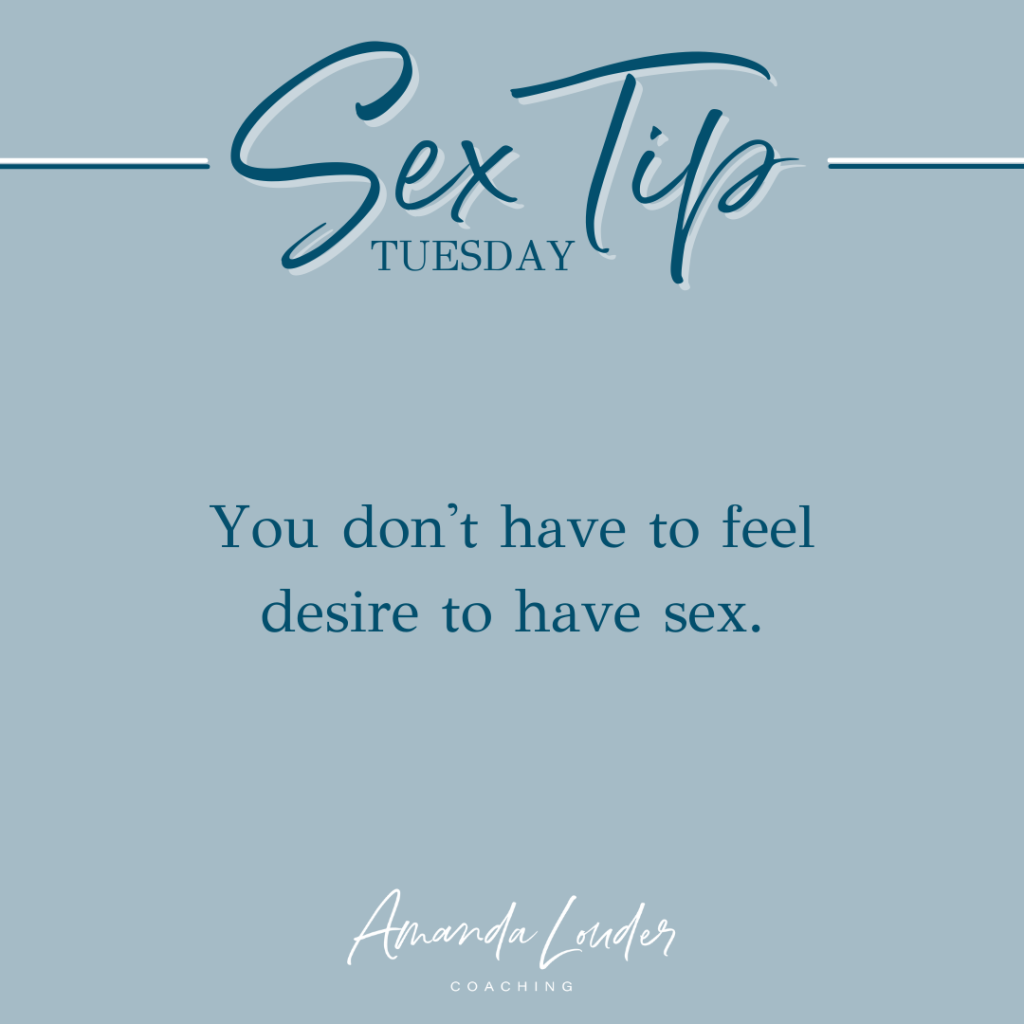
So many women I’ve talked to have said that they don’t have any desire to have sex anymore. It’s just gone. Now, I’ve talked about desire a lot on this podcast, but today I want to talk to you about one thing that I haven’t talked about before and it just may blow your mind. So, listen in while we talk about desire and how it’s affecting your sex life.
Show Notes:
Follow Amanda on Facebook and Instagram.
Join Amanda’s Private Facebook Group.
Show Summary:
One of the biggest complaints I hear from women, or maybe it’s just an observation that they have made, is that they just don’t feel desire anymore. They don’t feel desire like they used to. And if they do feel, it’s usually once or twice a month (which usually means around when they ovulate and when they are on their menstrual cycle when testosterone peaks.). I’ve spent a lot of time over the years talking about why women lose desire, how to create more desire, and how desire works differently for women than it does men. But today, I’m going to tell you something that I haven’t really talked about before.
You don’t need desire in order to have sex.
I know. It’s mind blowing right. You’ve probably got a lot of questions about this and hopefully I will answer them for you in this episode. But the biggest thing I want you to know right now is that having sex is a decision that you make and you can make that decision with or without desire. Let’s dig into this a bit more.
Desire is commonly seen as a natural and crucial element when it comes to engaging in sexual activities. It is often the driving force behind our physical and emotional attraction to others. When both partners share a mutual desire, the decision to have sex can be relatively straightforward. In fact, this is probably the reason that a majority of people get married. Yes, there are of course other factors, but if that desire to have sex with this person wasn’t there, you probably wouldn’t marry them.
But, as we’ve discussed on many previous podcasts, desire is not always present or consistent. When desire isn’t present, sex becomes more nuanced and requires a more thoughtful approach and a decision. Desire doesn’t have to be the most influential factor or determinant in sexual decision making. You can make the decision to have sex based on many other factors. And I would even say that considering these other factors can lead to healthier and more fulfilling sexual experiences.
When we can see sex as a decision, this can pave the way for more authentic connection and satisfaction in the sexual relationship. Sex can become about more than just satisfying a hormonal or physiological response. It can become about more than just a need for a physical release. It can become about deeper emotional and relational aspects of intimacy. It can be about trust, understanding, openness, vulnerability, and connection.
By shifting the focus from desire to decision we empower ourselves to take a more active role in our own sexual experiences. It helps us make other decisions and be deliberate about our choices that will lead us down the path to connection, intimacy, and a better sexual experience.
Let me give you an example from my own life. Many people just assume that I have a high sex drive. Maybe I have a more spontaneous desire for sex. That my desire for sex is always there. But that isn’t true. Yes, I think that maybe my desire is higher than some because I am thinking about sex and talking about sex all day long. But my body doesn’t just crave sex.
Throughout my marriage and in my daily life I make decisions that cultivate my trust, my understanding, my vulnerability, and my connection. I seek connection with my husband emotionally, mentally, spiritually, and physically. I make choices that foster that connection. I don’t wait for things to just happen. I make decisions and my desire often follows those decisions.
I also make choices that prioritize my self-care so that I have the physical and emotional energy to give to my spouse and children. If I don’t take care of myself and make myself a priority, I have much less to give everyone else. It makes it harder for me to make decisions that lead to connection when I haven’t connected with myself first.
I also make decisions when it comes to my relationship with my husband outside of the bedroom. I make decisions that help with our dynamics because I understand that impacts our sexual relationship. I work on myself so that we can resolve conflicts easier. The more decisions I make that foster my own personal growth, the easier it is to make decisions that help our sexual relationship.
It’s important when deciding whether or not to engage in sexual activity, to examine your motivations and intentions. Ask yourself why you are considering it, beyond desire alone. Is it an act of love, intimacy, or connection? Are there external pressures or expectations influencing your decision? If you are making the decision to not engage in sexual activity, why? Do you not feel emotionally connected? Are you feeling stressed and think it would add to your stress? Do you feel like you don’t have the capacity to engage? Can any of these things be changed if you were to practice self-care or have a conversation with your spouse? Understanding your own motivations helps ensure that the choice you make aligns with your values and emotional well-being.
Ultimately, when we make decisions that respect our individual wants, desires, and boundaries, and work to create an open dialogue where decisions are made collaboratively and with care between the two of us, decisions regarding our sexual relationship become easier because we trust each other. We feel safe with each other. We feel respected by each other. All of these impact us individually and us together, including our sexual relationship.
You can feel desire and decide NOT to have sex, you can also not feel desire and decide that you do.
Pay attention to responsive desire because a lot of time it kicks in later.





